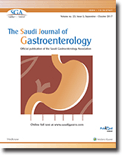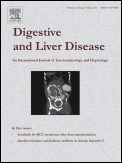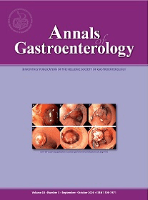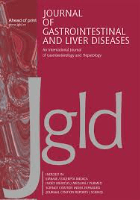
Saudi Journal of Gastroenterology
Scope & Guideline
Connecting researchers to the latest in gastroenterology.
Introduction
Aims and Scopes
- Gastrointestinal Disorders:
The journal addresses a wide range of gastrointestinal disorders, including inflammatory bowel disease, irritable bowel syndrome, and functional gastrointestinal disorders, contributing to the understanding of their epidemiology, clinical features, and management. - Liver Diseases:
There is a significant focus on liver diseases, including hepatitis B and C, non-alcoholic fatty liver disease, and liver fibrosis assessment, highlighting studies that explore diagnostic methods, treatment efficacy, and long-term outcomes. - Endoscopic Techniques and Innovations:
The journal publishes research on various endoscopic procedures, including their efficacy and safety in diagnosing and treating gastrointestinal conditions, as well as advancements in endoscopic technology and techniques. - Pediatric Gastroenterology:
A notable emphasis on pediatric gastroenterology is evident, with studies addressing gastrointestinal disorders in children, their management, and the impact on quality of life. - Nutrition and Gastrointestinal Health:
Research on the role of nutrition in gastrointestinal health, including dietary interventions and their effects on diseases like inflammatory bowel disease and obesity, is a key area of focus. - Clinical Guidelines and Consensus Statements:
The journal serves as a platform for disseminating clinical guidelines and consensus statements relevant to gastroenterology practice in the region, ensuring that practitioners are up-to-date with the latest recommendations.
Trending and Emerging
- Personalized Medicine in Gastroenterology:
There is a growing trend towards personalized medicine, with studies focusing on tailored treatment approaches for conditions like ulcerative colitis and chronic hepatitis, reflecting a shift towards individualized patient care. - Artificial Intelligence in Diagnostics:
The application of artificial intelligence in endoscopic procedures and diagnostics is emerging as a significant theme, highlighting the potential for technology to improve accuracy and outcomes in gastroenterology. - Impact of Lifestyle and Diet on Gastrointestinal Health:
Research exploring the effects of lifestyle factors, such as diet and fasting, on gastrointestinal health is gaining prominence, particularly in the context of cultural practices like Ramadan fasting. - Quality of Life Assessments:
An increasing number of studies are focusing on the quality of life of patients with gastrointestinal disorders, emphasizing the importance of patient-centered care and outcomes. - Multidisciplinary Approaches to Treatment:
There is a trend towards multidisciplinary approaches in managing gastrointestinal diseases, integrating insights from gastroenterology, nutrition, and psychology to address complex patient needs.
Declining or Waning
- Traditional Pharmacological Treatments:
There seems to be a reduced emphasis on traditional pharmacological treatments for gastrointestinal disorders, as newer therapies and personalized medicine approaches gain traction in research. - General Gastroenterology Research:
While specific gastrointestinal diseases are still well-covered, there is a noticeable decline in broader gastroenterology topics that do not focus on specific diseases or innovative treatments. - Surgical Interventions:
The frequency of studies focusing on surgical interventions for gastrointestinal diseases appears to be decreasing, possibly reflecting a shift towards less invasive techniques and endoscopic approaches. - Epidemiological Studies without Local Context:
There is a decline in the publication of epidemiological studies that do not specifically address local or regional contexts, as the journal increasingly prioritizes research relevant to Saudi Arabia and the Middle East. - Studies on Rare Conditions:
Research focusing on rare gastrointestinal conditions has decreased, as the journal appears to concentrate more on prevalent diseases and conditions affecting a larger patient population.
Similar Journals

Translational Gastroenterology and Hepatology
Bridging Discovery and Care in Gastroenterology.Translational Gastroenterology and Hepatology, published by AME Publishing Company, stands as a pivotal platform for advancing the understanding and treatment of gastrointestinal and liver diseases. With its focus on translational research, this journal aims to bridge the gap between laboratory discoveries and clinical applications, thus fostering improvements in patient care. Although specific metrics like H-Index and Scopus ranks are currently unavailable, the journal is committed to maintaining high standards of scholarly communication and excellence. As an open-access publication, it ensures that valuable findings are readily accessible to a global audience, promoting collaboration and innovation among researchers, clinicians, and healthcare professionals invested in gastroenterology and hepatology. The journal's dedication to disseminating groundbreaking research makes it an essential resource for those seeking to stay at the forefront of these ever-evolving fields.

Korean Journal of Gastroenterology
Fostering Global Dialogue on Digestive HealthKorean Journal of Gastroenterology (ISSN: 1598-9992, E-ISSN: 2233-6869), published by the Korean Society of Gastroenterology, has been a premier outlet for research and advancements in the field of gastroenterology since its inception in 1968. This open-access journal, based in South Korea, fosters a global dialogue on gastrointestinal health, embracing contributions from a diverse array of disciplines within medicine. It is currently ranked in the Q4 quartile for miscellaneous medicine and holds a Scopus rank of #323 out of 636 in general medicine, reflecting its commitment to publishing impactful research despite its relatively recent establishment in high-impact metrics. With a continuous publication timeline extending through to 2024, the journal aims to enhance understanding of gastrointestinal disorders and promote innovative treatments, making it an essential resource for researchers, clinicians, and students alike who seek to stay abreast of the latest developments and clinical applications in gastroenterology.

PRACTICAL GASTROENTEROLOGY
Connecting Theory and Practice in Gastrointestinal MedicinePRACTICAL GASTROENTEROLOGY is a distinguished journal dedicated to the field of gastroenterology, published by Shugar Publishing Inc in the United States. With an ISSN of 0277-4208, the journal serves as a pivotal resource for medical professionals, researchers, and students keen on staying abreast of the latest advancements and practical applications in gastrointestinal health. Although it does not currently operate under an Open Access model, it has been a respected publication since its inception, spanning significant years of research from 1989 to 2013 and resuming again from 2016 to 2023. Despite holding a current Q4 ranking in Gastroenterology with Scopus, its commitment to quality insights provides a platform for critical information dissemination, making it an essential read for those engaged in clinical practice and academic research. The journal’s objectives include addressing practical challenges in gastroenterology, bridging the gap between research and clinical implementation, and fostering ongoing education among practitioners in this dynamic field.

DIGESTIVE AND LIVER DISEASE
Transforming the landscape of liver disease research.DIGESTIVE AND LIVER DISEASE is a prominent journal published by Elsevier Science Inc, dedicated to advancing the field of gastroenterology and hepatology. With an ISSN of 1590-8658 and an E-ISSN of 1878-3562, this journal has established itself as a significant resource within the academic community, especially considering its Q2 ranking in both gastroenterology and hepatology categories as of 2023. Spanning from 2000 to 2024, the journal presents a diverse array of peer-reviewed articles, clinical studies, and review papers that explore the latest advancements and research findings in digestive and liver diseases. The journal's robust impact, reflected in its Scopus rankings—40th out of 167 in gastroenterology and 28th out of 82 in hepatology—highlights its critical role in shaping practices and understanding in these vital areas of medicine. With open access options available, DIGESTIVE AND LIVER DISEASE aims to make high-quality research accessible to a wider audience, thereby encouraging collaboration and innovation. Researchers, healthcare professionals, and students alike will find valuable insights into the complex mechanisms, diagnostics, and therapeutic strategies pertinent to digestive and liver health.

Canadian Journal of Gastroenterology and Hepatology
Fostering Collaboration in Gastrointestinal and Liver StudiesCanadian Journal of Gastroenterology and Hepatology, published by HINDAWI LTD, serves as a vital resource in the fields of gastroenterology and hepatology. Since its inception in 1987, this open-access journal has made significant contributions to advancing research and clinical practice through its comprehensive coverage of topics ranging from liver diseases to gastrointestinal disorders. With an impressive Q2 ranking in Gastroenterology and a Q3 ranking in Hepatology as of 2023, the journal has established itself as an influential platform for researchers and healthcare professionals seeking to disseminate and acquire knowledge. The journal is based in Egypt, with its operational headquarters located in London, England. Notably, it holds a respectable standing in Scopus rankings, placed at Rank #64 in Gastroenterology and Rank #34 in Hepatology, reflecting its impact and relevance in the medical community. With a commitment to quality and accessibility, the Canadian Journal of Gastroenterology and Hepatology continues to foster innovation and collaboration among its readers.

Pediatric Gastroenterology Hepatology & Nutrition
Empowering pediatric care with cutting-edge insights.Pediatric Gastroenterology Hepatology & Nutrition is a pivotal academic journal published by the Korean Society of Pediatric Gastroenterology & Nutrition, focusing on the critical fields of pediatric gastroenterology, hepatology, and nutrition. Located in South Korea, this journal aims to disseminate high-quality research, review articles, and clinical studies to advance knowledge and practice in the care of children with gastrointestinal and nutritional disorders. With a Converged Years span from 2012 to 2024 and categorized in the Q2 and Q3 quartiles in 2023 across multiple related fields, the journal holds a significant position within the academic community, reflecting its impactful contribution to the discipline. Although currently not open access, the journal ensures that content is accessible to a broad audience through various institutional subscriptions. The journal appeals to researchers, healthcare professionals, and students alike, providing an essential platform for the exchange of innovative ideas and research findings aimed at improving pediatric patient care.

GUT
Exploring Innovations in Gastrointestinal ResearchGUT is a premier journal in the field of gastroenterology, published by the esteemed BMJ Publishing Group. With a rich history dating back to 1960 and an impressive convergence of research expected to continue through 2024, GUT has established itself as a cornerstone of academic discourse in the gastrointestinal sciences. The journal boasts a remarkable impact factor, positioning it in the Q1 category for gastroenterology with an outstanding rank of #3 out of 167 in its Scopus ranking, reflecting its 98th percentile status among peers. Although it does not currently offer open access options, GUT remains dedicated to disseminating high-quality research, reviews, and clinical studies that advance the understanding of digestive health. Published in the United Kingdom, GUT serves as an essential resource for researchers, clinicians, and students aiming to stay at the forefront of innovations and developments in the field.

Gastroenterology Research
Pioneering insights into gastrointestinal diseases and treatments.Gastroenterology Research is a prominent scholarly journal dedicated to advancing the field of gastroenterology. Published by ELMER PRESS INC, this journal serves as a vital platform for disseminating innovative research, clinical findings, and comprehensive reviews that explore the complexities of the gastrointestinal system. With an ISSN of 1918-2805 and an E-ISSN of 1918-2813, it reaches a global audience of researchers, healthcare professionals, and students eager to contribute to or keep abreast of the latest developments in gastroenterology. Though details such as the H-index and Scopus rankings are currently unspecified, the journal's commitment to quality and impact in the medical research community is evident. Gastroenterology Research aims to foster collaboration and knowledge sharing among experts, ultimately improving patient care and outcomes within this critical area of health science. Explore the cutting-edge studies published within its pages and engage with a community passionate about the investigation and treatment of gastrointestinal diseases.

Annals of Gastroenterology
Unveiling Innovations in Gastrointestinal MedicineAnnals of Gastroenterology, published by the Hellenic Society of Gastroenterology, serves as a pivotal platform for advancing the field of gastroenterology, highlighting research that spans across the spectrum of gastrointestinal diseases and treatments. With an ISSN of 1108-7471 and E-ISSN of 1792-7463, this journal has established itself as a reputable source of scholarship since its inception in 2000, converging valuable insights through to 2024. Ranking within Q2 of its category and achieving a respectable 78th position out of 167 in the Scopus rankings, the journal holds a strong presence in the academic community, appealing to researchers, clinicians, and students alike. Although not an open access publication, Annals of Gastroenterology is dedicated to disseminating high-quality research that aids in the understanding and treatment of gastrointestinal conditions, making it an essential reference point for those engaged in this dynamic field.

Journal of Gastrointestinal and Liver Diseases
Shaping the Future of Gastrointestinal and Liver ResearchThe Journal of Gastrointestinal and Liver Diseases, published by MEDICAL UNIV PRESS in Romania, serves as a pivotal platform for the dissemination of significant research in the fields of gastroenterology and hepatology. Established in 2006, this journal has evolved over the years, currently holding a Q3 rank in Gastroenterology and a Q2 rank in Medicine (miscellaneous), reflecting its commitment to high-quality scholarship and impactful contributions to medical science.
With an ISSN of 1841-8724 and an E-ISSN of 1842-1121, the journal engages a diverse readership of researchers, clinicians, and students passionate about advancing knowledge in gastrointestinal and liver health. While it currently does not operate under an open access model, the journal remains a vital resource for those seeking to stay updated on the latest developments and emerging trends in the field. As it converges towards a broader impact, projected through its coverage until 2024, the Journal of Gastrointestinal and Liver Diseases continues to contribute to the academic landscape, encouraging innovation and comprehensive understanding in digestive health.